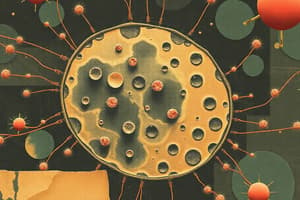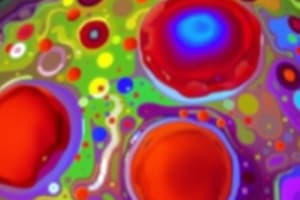Podcast
Questions and Answers
What are the building blocks of life?
What are the building blocks of life?
Cells
Which of the following is NOT a part of protoplasm?
Which of the following is NOT a part of protoplasm?
- Cell wall (correct)
- Nucleus
- Cell surface membrane
- Cytoplasm
The cell surface membrane is a selectively permeable membrane.
The cell surface membrane is a selectively permeable membrane.
True (A)
What does the nucleus contain?
What does the nucleus contain?
Which organelle is responsible for energy production?
Which organelle is responsible for energy production?
The ___ is a fluid-filled organelle that provides support for a plant cell.
The ___ is a fluid-filled organelle that provides support for a plant cell.
What is the function of the rough endoplasmic reticulum?
What is the function of the rough endoplasmic reticulum?
Match the following organelles with their functions:
Match the following organelles with their functions:
The smooth endoplasmic reticulum is involved in detoxifying harmful substances.
The smooth endoplasmic reticulum is involved in detoxifying harmful substances.
Chloroplasts are found in which type of cells?
Chloroplasts are found in which type of cells?
What is differentiation in cells?
What is differentiation in cells?
Flashcards are hidden until you start studying
Study Notes
Overview of Cells
- Cells are the fundamental building blocks of all living organisms.
- Each living cell consists of protoplasm, which is composed of three main components.
Protoplasm Parts
- Cell surface membrane: Selectively permeable barrier controlling substance movement and reacting to external stimuli.
- Cytoplasm: Gel-like substance containing organelles; site of many cellular processes.
- Nucleus: Contains hereditary material and DNA; directs cell activities including growth.
Cell Surface Membrane
- Composed of proteins and phospholipids.
- Forms a boundary between the cell's internal environment and external surroundings.
- Allows smaller molecules, such as water, to pass through via its selective permeability.
Nucleus
- Houses chromatin that condenses into chromosomes during cell division.
- Surrounded by a double membrane known as the nuclear envelope, which has pores regulating substance exchange.
- Controls cellular functions and activities, including growth.
Cell Wall (Plant Cells Only)
- Rigid structure made of cellulose; provides support and protection against overextension.
- Inelastic and permeable, allowing substances to pass through freely.
Organelles in Cytoplasm
- Rough Endoplasmic Reticulum (RER): Studded with ribosomes, involved in protein synthesis and transport out of the cell.
- Smooth Endoplasmic Reticulum (SER): Tubular, synthesizes hormones and steroids, detoxifies substances, and forms Golgi body.
- Golgi Apparatus: Stack of membrane-bound sacs; modifies, stores, and packages substances from the ER for secretion.
- Ribosomes: Composed of rRNA and proteins; synthesize proteins either within the cytoplasm or attached to RER.
- Mitochondria: Double membrane organelle, responsible for ATP (energy) production; highly active cells can contain up to 1000 mitochondria.
- Chloroplasts (Plant Cells Only): Double membrane organelle containing chlorophyll; site of photosynthesis; converts sunlight into glucose.
- Vacuoles: Fluid-filled spaces providing structural support in plants and storing waste products and nutrients.
Cell Specialization
- Differentiation is a process where newly formed cells develop specialized structures or lose certain structures to perform specific functions.
- Human body consists of various specialized cell types adapted for different roles.
Studying That Suits You
Use AI to generate personalized quizzes and flashcards to suit your learning preferences.




